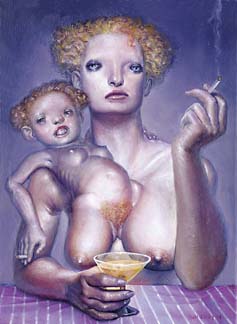
Current Issue Highlights More Readings DA Home About Direct Art

Heartache, oil on canvas, 2004, 12" x 16"
Scott G.Brooks
The Clash of the Heavenly VirtuesIfind myself sitting across the table from a beautiful blond sipping a martini. The parasitic twin protruding from her chest reclines, her arm around the host’s neck. They both pause from their smoking to regard the viewer. The woman’s heart and her twin’s vagina are interwoven. Host? Parasite? Which is which? In the world of Scott G. Brooks, a single glance is not enough. His work first attracts viewers with technical virtuosity and then—as they lean closer—knocks them over the head.
Scott pulls together social commentary, psychological twists, cultural critique, and physical disfigurements into a bizarre and captivating visual world. As a resident of Washington, D.C., since 1990, he has inevitably added a few political jabs to the mix.
In "Liberty Takes a Holiday," an allegorical figure representing America hangs dying on a cross in Arlington Cemetery. She towers above the tombstone fields of others killed in the name of war. With storm clouds looming over the Capitol in the distance, the painting is the artist’s take on the current administration and its impact on the country and the world. Liberty raises her head toward a patch of blue sky—a fading window of hope or a sign of brighter days ahead?
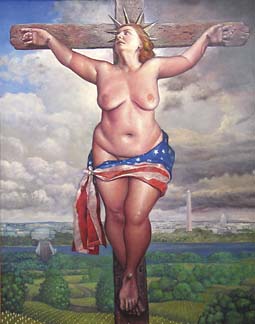
Liberty Takes a Holiday," oil on canvas, 2003, 48" x 60"
"Liberty" takes center stage wherever it is shown. Created for the exhibit "Propaganda of War," in August 2003, the large painting has been on display in various venues since that time. "It’s a very iconic painting," Scott explains, "merging strong symbols of Christianity and America. Sadly, the painting has become more relevant as time goes on."
We first caught up with Scott in 2004 at Artomatic, the month-long exhibit held in Washington, D.C., every two years. He was showing his latest work: small graphite and pastel drawings depicting "The Seven Deadly Sins" and "The Three Heavenly Virtues." Also on display were "Liberty" and four smaller paintings.
The intimate drawings of "The Virtues" had struck a chord at the previous Artomatic, and "The Seven Deadly Sins" were long past due. Since "The Virtues" were female, "The Sins" would be male. Gluttony leads the series as a toddler holding a decapitated baby bunny. He has ripped off the head and is gleefully feeding, with blood spattering his bib and entrails dangling from his cherubic mouth. Vanity, eyeing himself in a mirror, shows off his perfect Cindy Brady curls and his perfect matching poodle. Faith, Hope, and Charity also make an appearance, each offering up a disturbing take on her particular virtue.
Lenny Campello, a D.C. art critic, wrote of Scott in his Artomatic 2004 review:
"Creating a new place for himself is an illustrator named Scott Brooks, who in this new Artomatic incarnation is like a strange, macabre John Currin, but can paint and draw a lot better than Currin ever learned to. A lot of people were talking about Brooks’ disturbing images; this is usually a sign of success for any visual artist. Both the police and art collectors need to keep an eye on this talented artist."
Scott’s work for children is already widely appreciated. He has illustrated two children’s books, The Three Armadillies Tuff and The Ring Bear, and is working on several more. One minute he is creating illustrations for children’s publishing, and the next he is painting a bizarre world of amputations, sexuality, dog-babies, and drunkenness.
The man behind the work is as unassuming as his work is in-your-face. He’s intense at times but quick to laugh. He describes his life as "boring" and talks of balancing work with a long-term relationship, seeing friends, catching the latest movie, getting out of town. So from where does the inspiration for his work spring forth? Hard to say.
Scott’s own childhood was seemingly idyllic. The middle-class, suburban, Catholic upbringing with two brothers and a sister is ordinary enough. It starts to get odd when you add the long list of pets that came and went. Dogs, cats, birds, fish, gerbils, guinea pigs, snakes, frogs, and even alligators and chickens inhabited the house just north of Flint, Michigan. Scott recalls, "It was chaos most of the time."
The zoo-like atmosphere wasn’t the only influence. Scott explains, "I remember being exposed to very graphic imagery when I was young, including my mother’s nursing magazines and my father’s porn stash." TV and monster movies also had an impact, as did comic books, Disney movies, MAD magazine, and religious imagery. Scott adds, "My family also hunted, which exposed me to more killing, death, and blood. It was all very natural to me."
Addiction issues escalated the chaos into dysfunction, and as a teenager Scott was witness to the death spiral of his father. To escape the craziness, Scott took refuge in drawing, where he could funnel the chaos into his own creations.
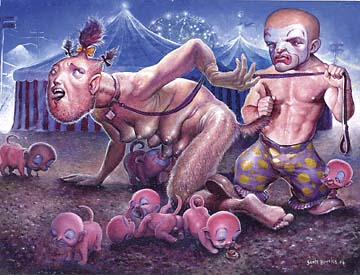
Jojo the Dog-Faced Girl Takes Her Walk, oil on canvas, 2004, 12" x 16"
Scott’s studio is near the Washington, D.C., neighborhoods of Dupont Circle and Adams Morgan, close to the Smithsonian Museums, the White House, and the Capitol. His sixth-floor corner studio faces south, affording a panoramic view of downtown and the Washington Monument. "The view’s not what it used to be," he remarks, taking a cynical view of the D.C. skyline.
Among the art work in Scott’s apartment are remnants of "The Train Wreck Series." The large paintings began as a response to the end of a 14-year relationship and depict emotional pain and distress on a physical level. The six paintings were already in progress on September 11, 2001, adding another layer of relevance.
At first, the "Train Wreck" pictures appear as a tangle of victims suffering from grisly, mortal wounds. Looking more closely, you see the wounded are not only carrying on, but defiant. One, a naked man with two stumps for legs and only one good arm, inches painfully across a tightrope as a Gothic church looms in the background. Another, a man of substantial girth, perches on a barstool and enjoys a smoke, clearly undeterred by his missing limbs.
"People bring their own baggage with them when they view my work," the artist says. "If they only see twisted, deformed imagery, perhaps that’s how they view the world." Scott’s work, while dark, also contains great beauty—if not in subject matter, then in technique.
Friends describe his work as raw, honest, and uncensored. Scott insists there is irony and humor in most everything he does—then pauses and adds, "for the most part."
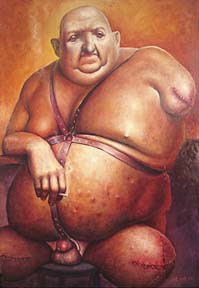
"Some of my paintings are purely tragic: ‘Liberty Takes a Holiday’ and ‘Allegory of a Gay Bashing,’ to name two." Despite Scott’s wry additions of a sad-eyed puppy and a fluffy kitten, the viewer is still a witness to a crucifixion in both.
A distinctive, recurring feature in Scott’s work is the impossibly wide-set eyes of his subjects. "I had a problem being labeled a photorealist, and the eye thing just evolved. It abstracts the figure and separates me from the photographic ideal, allowing me freedom I wouldn’t have if I rendered it anatomically correct." Besides, he says, the wide-set eyes are more expressive.
He works in a variety of media, including oil on canvas, acrylic on paper, and graphite with pastel on paper. "I’m most comfortable with the pencil, and drawing is second nature for me. I hadn’t exhibited any drawings for many years until Artomatic 2002, and the response there was overwhelming."
Scott’s drawings will be the focal point of a solo show this fall at Gallery Neptune in Bethesda, Maryland. Owner Elyse Harrison declares Scott "a master of graphite and pastel, work I will be proudly exhibiting at my gallery in the fall of 2005." She first saw Scott’s work in the spring of 2004 and became an instant fan. Elyse explains, "Certainly even the untrained eye quickly recognizes Scott’s facility with painting and drawing, but fellow artists truly admire this talented gentleman."
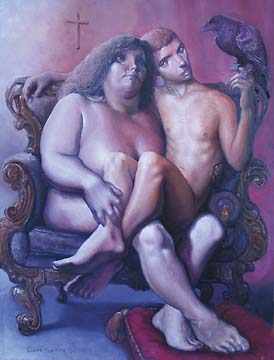
An overriding conflict in Scott’s life is the incongruity between his fine-arts work and his illustrations for children. Difficulties integrating the two facets and resolving their apparent contradictions haunt him. He maintains separate websites and different e-mail addresses, one for fine arts and one for children’s work, with very little crossover.
"Books and images had a real impact on me while growing up, and I enjoy the opportunity to connect and communicate on that level. My fine-arts work comes from an equally valid place. Neither wants to be put on a back burner."
Regardless of which route you take in meeting Scott and his work, the flip side can be a startling but satisfying surprise.
More of Scott’s work can be seen on his websites: www.scottgbrooks.com and www.sgbrooks.com.Current Issue Highlights More Readings DA Home About Direct Art